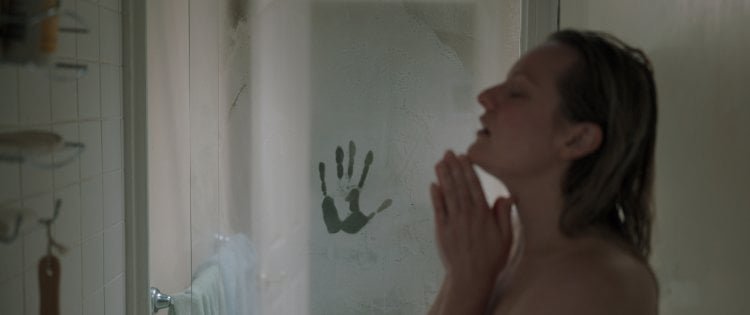The Invisible Man

Cecilia Kass (Elisabeth Moss) is so terrified of her abusive ex-boyfriend, she can’t even make it to the mailbox outside the home she’s been hiding out in. After her sister Emily (Harriet Dyer, TV's 'The Other Guy') brings news of the optics entrepreneur’s suicide, Cecilia begins to breathe easier. But soon she’s suffering gaslighting of the worst kind, the type where it is easier for everyone to believe she’s gone crazy than believing she is being tormented by “The Invisible Man.”
Laura's Review: B+
Writer/director Leigh Whannell ("Saw," "Upgrade") aces adapting H.G. Wells’ nineteenth century novel for the modern #MeToo age as a paranoid thriller, low budget effects à la “Paranormal Activity” effecting big chills, Elisabeth Moss excelling as a woman with only herself to turn to. It is somewhat disappointing that a plot point or two become credibility hurdles, but with every other aspect of the film working as well as it does those are easy to overlook.
There haven’t been many adaptations of Wells’s novel, most either sequels to James Whales’ 1933 classic starring Claude Rains, meetings with Abbott and Costello or loosely based modernizations. Whannell’s take is particularly inspired by his flipping of the script’s point of view to the titular villain’s victim while exploring an age old issue currently making headlines - believing victims of sexual harassment and psychological abuse, crimes where evidence is awfully hard to come by.
The film’s opening is a doozy, set in Adrian Griffin’s (Oliver Jackson-Cohen, Netflix's 'The Haunting of Hill House') dramatic concrete block seaside cliff house, its master bedroom a glass walled chamber jutting out over the sea. It is the middle of the night and the woman we come to know as Cecilia lifts a man’s hand from its embrace of her, slips a bottle of Diazepam out from beneath the mattress (which she will later drop), trains an interior camera on the sleeping man and takes off with a secretly prepacked bag. Careful not to make a sound, we agonize when she trips over Doberman Zeus’s metal dog dish and it is Zeus again, whimpering at Cecilia’s exit, who will cause her to accidentally set off a car alarm. Scaling a wall, the woman rushes over a field and through some woods to a remote road where her sister will pick her up just as Adrian arrives to smash the car’s window in. The sequence is a master class in suspense, beautifully shot and edited (by “Upgrade’s” Stefan Duscio and Andy Canny), set to a stormy score (by “It’s” Benjamin Wallifisch).
Cecilia is obviously in good hands at the modest home of San Francisco cop and friend-since-childhood James (Aldis Hodge, "Clemency") whose teenaged daughter Sydney (Storm Reid, "A Wrinkle in Time") enjoys a warm relationship with the older woman. But the red flag Cecilia is waiting for after news of Adrian’s death arrives in the form of a legal notice addressed to her in the home no one supposedly knows she’s been living in. Emily attends the meeting with her at the office of Adrian’s lawyer and brother Tom (Michael Dorman, "Daybreakers") who informs her she is the recipient of a $5 million trust from which $100K will be fed into her bank account on a monthly basis as long as she doesn’t break the law or lose her sanity. Cecilia immediately presents Sydney with a new bank account containing $10K as the beginning of her Parsons School of Design fund. (James is gifted with a ladder, one of many props introduced organically to serve alternate purposes later.)
But as Cecilia admires a new dress she’s just bought, we can see her sensing an unseen presence in the room. At night, her and Sydney’s blanket will be stripped from the bed, then weighted by ghostly footprints when Cecilia tries to retrieve it. On her first job interview, Cecilia’s architecture portfolio is suddenly empty and a subsequent fainting spell reveals a high level of Diazepam in her blood. Escalation to physical violence causes James to prioritize his daughter’s safety over Cecilia’s. When she’s set up for murder, Cecilia’s locked down in a mental institution where she shares space with someone only she knows is there (shades of Steven Soderbergh’s “Unsane”).
The film is very ingenious in how it stacks the deck against our heroine and in how she bravely takes on her tormentor. Production design aligns the clean modernity of Adrian’s home with Cecilia’s mental institution, both a contrast from the warmth of James’s modest home. Duscio uses space effectively, more expansive shots causing our eyes to dart around the frame while cramped views increase anxiety.
Universal’s first attempt at bringing back their classic monsters in a series of interrelated films fizzled. With this standalone chiller, one which it should be noted has been adroitly set up for a sequel, they’ve found the right path.

